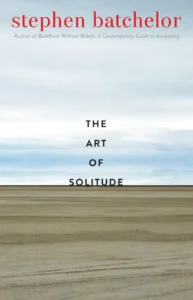The Art of Solitude: Buddhist Scholar and Teacher Stephen Batchelor on Contemplative Practice and Creativity
INSPIRATIONAL, 29 Jan 2024
Maria Popova | The Marginalian - TRANSCEND Media Service
 “Give me solitude,” Whitman demanded in his ode to the eternal tension between city and soul, “give me again O Nature your primal sanities!” In those primal sanities, we come to discover that “there is no place more intimate than the spirit alone,” as May Sarton wrote in her stunning 1938 ode to solitude — her hard-earned testimony to solitude as the seedbed of self-discovery, for it is in that intimate place that we see most clearly what our animating spirit is made of. Solitude, Kahlil Gibran knew, summons of us the courage to know ourselves. Elizabeth Bishop believed — a belief I can attest to with my own life — that everyone must experience at least one long period of solitude in life in order to know what we are made of and what we can make of our gifts. “There is only one solitude, and it is large and not easy to bear,” Rilke wrote in contemplating the relationship between solitude, love, and creativity, “but… we must hold ourselves to the difficult.”
“Give me solitude,” Whitman demanded in his ode to the eternal tension between city and soul, “give me again O Nature your primal sanities!” In those primal sanities, we come to discover that “there is no place more intimate than the spirit alone,” as May Sarton wrote in her stunning 1938 ode to solitude — her hard-earned testimony to solitude as the seedbed of self-discovery, for it is in that intimate place that we see most clearly what our animating spirit is made of. Solitude, Kahlil Gibran knew, summons of us the courage to know ourselves. Elizabeth Bishop believed — a belief I can attest to with my own life — that everyone must experience at least one long period of solitude in life in order to know what we are made of and what we can make of our gifts. “There is only one solitude, and it is large and not easy to bear,” Rilke wrote in contemplating the relationship between solitude, love, and creativity, “but… we must hold ourselves to the difficult.”
The visionary poets knew — as do the visionaries of scientist, as do all persons engaged in lives of creativity or contemplation, which are often one life — how this solitary self-discovery becomes the wellspring of all the meaning-making that makes life worth living, whether we call it art or love. From solitude’s promontory, we peer out into the expanse of existence and train our eyes to look with wide-eyed wonder at the improbable fact of it all. Solitude, so conceived, is not merely the state of being alone but the art of becoming fully ourselves — an art acquired, like every art, by apprenticeship and painstaking devotion to dwelling in the often lonesome inner light of our singular and sovereign being.
TO CONTINUE READING PLEASE Go to Original – themarginalian.org
Tags: Buddhism, Creativity, Inspirational, Solitude
DISCLAIMER: The statements, views and opinions expressed in pieces republished here are solely those of the authors and do not necessarily represent those of TMS. In accordance with title 17 U.S.C. section 107, this material is distributed without profit to those who have expressed a prior interest in receiving the included information for research and educational purposes. TMS has no affiliation whatsoever with the originator of this article nor is TMS endorsed or sponsored by the originator. “GO TO ORIGINAL” links are provided as a convenience to our readers and allow for verification of authenticity. However, as originating pages are often updated by their originating host sites, the versions posted may not match the versions our readers view when clicking the “GO TO ORIGINAL” links. This site contains copyrighted material the use of which has not always been specifically authorized by the copyright owner. We are making such material available in our efforts to advance understanding of environmental, political, human rights, economic, democracy, scientific, and social justice issues, etc. We believe this constitutes a ‘fair use’ of any such copyrighted material as provided for in section 107 of the US Copyright Law. In accordance with Title 17 U.S.C. Section 107, the material on this site is distributed without profit to those who have expressed a prior interest in receiving the included information for research and educational purposes. For more information go to: http://www.law.cornell.edu/uscode/17/107.shtml. If you wish to use copyrighted material from this site for purposes of your own that go beyond ‘fair use’, you must obtain permission from the copyright owner.
